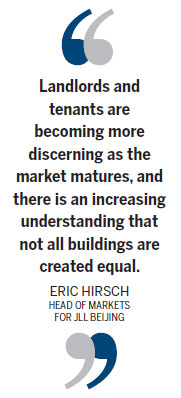Firms willing to pay for CBD locations
Updated: 2014-08-08 07:17
By Yao Jing and Sun Li (China Daily Europe)
|
|||||||||||
|
Office rents in Beijing's central business district in Chaoyang district rose 2.9 percent quarter-on-quarter in the second quarter of this year. Provided to China Daily |
Demand for grade-A office space in major cities holds its own in a weakening property market
Office space in core areas of China's big cities is getting more expensive. But instead of walking away, companies are paying up, topping expectations in China's commercial property sector in an overall weak real estate market.
The demand for grade-A office space in major cities has remained steady, driven by a lack of new supply, low vacancy rates, domestic companies' interest in new leases and increasing confidence on the part of landlords, according to property services consultants and providers.
A glance at a skyscraper in Beijing's central business district in Chaoyang district gives evidence of the trend.
China World Trade Center Tower III, at 81 stories and one of the tallest buildings in Beijing, is also the most expensive office building in the CBD. It currently is home to about 70 companies.
East of the building, the China World Trade Center Phase 3B project is under construction.
In the second quarter of the year, Beijing's prime office market registered 39,800 square meters of net absorption. CBD rents rose 2.9 percent quarter-on-quarter, the first increase recorded in six quarters, according to a report by Jones Lang La Salle IP Inc, a real estate management company.
Strong leasing velocity in the nearby Fortune Financial Center, coupled with limited availability in the CBD, led key buildings, such as China World Trade Center, to regain confidence and raise rents.
The banking and insurance industries were the main drivers of demand, and several new leases were signed in the sector.
Domestic companies again accounted for the majority of new leases, while foreign firms generally renewed or leased comparatively smaller spaces.

"Landlords and tenants are becoming more discerning as the market matures, and there is an increasing understanding that not all buildings are created equal," says Eric Hirsch, head of markets for JLL Beijing.
By comparison, most other submarkets were flat or registered minimal increases.
For Zhang Ying, managing director at JLL North China, the rising rents and growing construction areas in the CBD were a sign of something more: signs of the company's expansion in China.
Working for JLL for 18 years, Zhang has witnessed the company's growth from a single office with three people to one having more than 2,000 staff members.
Meanwhile, starting from a 360-square-meter office in Fulllink Plaza in Chaoyang district, the company's Beijing branch represented the first company to move into the China World Trade Center Tower III in 2010.
It now occupies a spacious office on the 11th floor of the landmark building, with a unit size of nearly 3,500 sqm.
During construction, the company stayed in the World Trade Center Tower I from 2003 to 2010.
"The size of our business is 24 times than that of 10 years ago, and the number of employees is 13 times," Zhang says.
An expert in commercial property, JLL was selective about when to sign its tenancy contract. "I think our rent is at the lower level among tenants of the building as we came here when the net take-up of the city's office market was low," Zhang says.
Zhang says Beijing's office market hit bottom at the end of 2009, but rents climbed in 2011.
Surrounded by numerous banking and insurance companies, law firms as well as multinational companies, JLL hopes to attract more talent, win clients' trust and improve its expertise in the commercial property market.
"Employees and our customers will be happy to see our stable growth within one area," says Zhang.
Still, the CBD is not the most expensive area in Beijing. With domestic financial companies continuing to expand to Financial Street, prime office rental growth is continuing there.
But worsening traffic conditions and a lack of new supply in the CBD is pushing some companies to look into emerging industrial parks.
"An increasing number of companies such as Siemens AG, Alstom SA and Microsoft Corp, are establishing their headquarters in the capital's Wangjing area," says Liu Bing, head of investment and advisory services at North China DTZ, a real estate consulting firm.
Office space in industrial parks is much cheaper than in the CBD. Beijing CBD rent tallied 336.9 yuan ($55, 40 euros) per square meter in the second quarter, while the Beijing grade-A office rent was 300.8 yuan per square meter per month, according to DTZ.
In Shanghai, grade-A office vacancy rate in the Pudong New Area fell to a record low in the past six years, to approximately 1.2 percent, said a report by Colliers International, a commercial real estate service company.
By the end of June, average rent in the Pudong grade-A office market rose by 3.8 percent year-on-year to approximately 9.1 yuan per square meter per day, primarily supported by the robust increase in Pudong, which continued to outpace Puxi given its limited supply and increasing demand.
The CBD grade-A office market received four new completions with a combined office gross floor area of 202,452 sqm, three of them located in Puxi.
"Demand from corporations relocating from downtown areas as well as those upgrading from lower grade buildings was stimulated by the new completions, with net absorption increasing by 42.7 percent year-on-year in the first half of 2014," said the report.
James Shepherd, executive director and head of research for greater China at Cushman & Wakefield, a privately held commercial real estate services firm, says the peak of office development in Shanghai's CBD will happen between 2015 and 2017 in such large developments as Shanghai Tower, Bund Financial Center, Xujiahui Center and Pudong Financial Plaza.
"It will likely be a winner-take-all market, with good projects having high pre-commitment rates, while poor projects struggle to lease at all. Demand for Shanghai Tower (China's tallest building and the world's second-tallest) is likely to be strongest from domestic companies," says Shepherd.
In Guangzhou, capital of Guangdong province, demand for grade-A offices also increased in the second quarter of the year, following government policies to boost the economy and increase investment in finance and technology.
Several big transactions, especially by finance, securities and high-tech companies, were reported in the second quarter in Guangzhou, according to Cushman & Wakefield.
The report predicted that the vacancy rate of grade-A offices in Guangzhou will drop to 12 percent by the end of the year as the Pearl River Delta economy has started picking up since the second quarter.
The reduced vacancy rate of grade-A offices in Guangzhou indicates stronger demand from domestic companies, says Ma Weitu, director of JLL South China.
Qiu Quanlin contributed to this story.
Contact the writer at yaojing@chinadaily.com.cn
(China Daily European Weekly 08/08/2014 page19)
Today's Top News
Putin bans agricultural imports from West
UK names 'China hand' as new envoy
China film looks to global audience
China to exclude Apple products
Dutch firm to take over MH370 search
Nanjing takes fresh approach to Youth Olympics
China to punish Chrysler, Audi over monopoly
Beijing boosts checks on foreigners
Hot Topics
Lunar probe , China growth forecasts, Emission rules get tougher, China seen through 'colored lens', International board,
Editor's Picks

|

|

|

|

|

|






